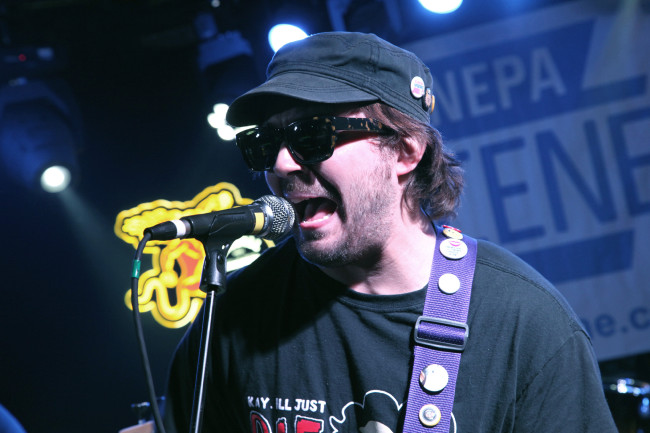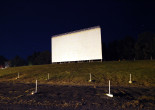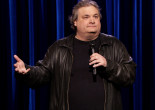Hazleton folk punk Tedd Hazard declares ‘Marshall Law’ and releases George Floyd protest EP

With protests against racial injustice, riots tearing cities apart, eroding trust in law enforcement and government, an ongoing global pandemic, a shutdown causing businesses to collapse while unemployment rises, and political division at an all-time high, there may be no better time for some punk rock music.
Just two months after releasing the strangely prophetic album “Marshall Law,” complete with cover art depicting a bridge to a city going up in flames while a hooded figure holds a gas can, Hazleton folk punk singer/songwriter Tedd Hazard has produced a two-song EP to raise money for the George Floyd Memorial Fund.
“I really wanted to help out any way I can. I came up with the idea day after the riots broke out. I never thought that I would have been able to go to any of them, so I wanted to try and do my part, but I ended up being a part of the Pottsville protests, and I’m glad I was. I was able to raise some money for the George Floyd Memorial Fund. Not much, but it helps,” Hazard told NEPA Scene.
“The song ‘Fear and Loathing in Schuylkill County: Part 4’ is actually the fourth part of a long line of songs I’ve done over the years. I started writing it after a news report I saw on Asian Americans being blamed for the spread of COVID-19. I wasn’t able to finish the song until the tragedy of George Floyd. I tend to put a few different topics in my songs. The Pottsville protests sort of left me with mixed feelings. We stood up for something we believed in, but at the same time had to deal with very vocal hatred and criticism from members of the community that didn’t have the same opinions as us, so that’s why I decided to go with that name.
“‘And the Flowers Are Still Standing’ was written about a month ago. It’s very much geared towards living in lockdown and the paranoia certain political sects tend to have towards it. They took me a morning to record, and I had it out by Monday afternoon [June 1].”
Despite the seriousness of these topics, the 33-year-old musician and cartoonist had to include just a bit of his sense of humor in there by naming the EP “It’s a Trapt!” to jab at right-wing Trapt frontman Chris Taylor Brown and his ill-advised social media rants.
“I felt it was very fitting, especially with a lot of the riots getting ambushed on freeways and city streets. I tend to have a little fun with things even when I’m trying to be serious.”
Living in Hazleton, where he books rock and acoustic shows at one of its few cultural outlets, the Hazleton Art League, he has witnessed his fair share of racism firsthand.
“We’re a hotbed for immigration. I have friends, neighbors, coworkers who are Hispanic, black, Latin American, and I know people who are baby boomers. It’s awful because you can’t go a day without having to hear the N-word or having to witness someone looking out their window to make sure the Puerto Rican neighbors don’t ‘touch their car.’ Or hear them complain about ‘the lazy immigrants taking the jobs and using up all the welfare’ as they sit around doing nothing but watching the news. Which is it? Because it can’t be both. You’re afraid, not educated. It’s something I’ve had to deal with my entire life, and quite frankly, I think it’s disgusting,” he recalled.
“I’ve had friends who were harassed for little to no reason by the police, except the fact that they didn’t share the color of their skin. And it’s heartbreaking because it can be a much better place if we just stood together, but you just can’t teach some people anything new.”
Even though he is a self-described “folk punk troubadour” embedded in the local scene who often comments on punk music through his songs and Krust Tunes web comic/cartoon series, he is still hesitant to tell anyone else what punk rock is definitively or how people should express it.
“Punk is weird. There are some people who say punk needs to be political. There are some people who say punk is being yourself. And then there are some people who say you don’t need to be political to be punk. It can be all three, honestly. But who am I to say? Punk can be a lot of things, but I really think people arguing about what’s punk and what’s not, especially these days, is very counterproductive,” he noted.
What he is firm on, however, is that punks should be helping right now, which “doesn’t just mean protesting. It could be donating. Spreading information. Harboring individuals in need. Helping black voices be heard.”
Dropping sarcastic truth bombs
Hazard has been writing, recording, and performing with his harsh, throaty vocals since 2003, releasing his first solo album in 2010 and touring regularly since 2011. In all that time, he has struggled to describe his sound to others until recently.
“[My girlfriend] Katie’s dad, who is a big fan of mine, told me I sounded like ‘Tom Waits if he sang for Green Day.’ The lyrical content has been described as honest, aggressive, and cynical. 5-7-0 Press even compared me to Hunter S. Thompson, which I can see. I don’t even really try these days to pull from any of my influential artists. I have a formula I go with and it seems to work for me,” he said.
It isn’t for everybody, but he seems fine with that. He has always found himself drawn to anything different, anything outside the mainstream.
“I always like to cheer for the underdog or whoever is being looked over, so in 2003, when I was first invited to a punk show, I was already kind of part of that early 2000s counterculture because nobody else would have me. But when I got into the local scene, I really felt it resonated with me because I was already kind of a misfit myself. Even later on, in 2010, when my band went on to pursue other interests, I found myself tired of your run-of-the-mill punk because it was so overdone,” he explained.
“And having to correspond with four other people was becoming exhausting when I had all these ideas. It’s like you had to put every single one of your songs through a committee, and if there was one lyric or chord somebody didn’t agree with, the whole thing was scrapped. If you want to play a show, you have to wait on three other text messages to see if they can do it. And forget touring – it’s almost impossible with a lot of people these days. I think a lot of that is why I decided to start playing out by myself, because I was tired of waiting.”
Hazard can never been accused of waiting around, recording eight full-length albums, nine EPs, and two B-side collections since 2009 as well as some music with his newest band, Charles Manson Dance Academy.

“My music has definitely evolved over the years. I went from barely knowing how to play open chords (I used to be a bass player before I played guitar in Rage for Cousin Jamie until the drummer, Jarred Larock, suggested I just play guitar) to being able to construct entire songs in seconds. I would say my earlier work is very unpolished. I didn’t really have that voice down yet, and I was trying a lot of new things. The lyrical content was similar, but I wouldn’t say it was the same. Life has a tendency to do that to you when you’re a songwriter. I’d say the older stuff was more or less about trying to figure out who you were and living in the now, whereas the stuff from the mid-10s is more or less about regrets and experiences,” he described.
“These days, a lot of my material has a tendency to be about realizing your own mortality and kind of being fed up with a lot of what’s going on in my personal life and the world today. But I’d say a lot of these topics kind of crossover into each other, like some kind of sarcastic atomic bomb.”
Like the destruction they leave in their wake, building those bombs is a “very erratic” process.
“Sometimes songs can come to me in an instant. I write all my lyrics in my head and rarely touch pen to paper. Other songs take years to tweak. I still have stuff I wrote in 2017 I’m not too keen on that I’d like to use eventually, but I just can’t find the right way to play it yet. Every song I write is rarely based on one topic. I tend to take a few different things from the tree of life and try to shove it into two minutes to kind of keep the listener guessing but, at the same time, keep them interested. Recording is a love/hate process for me. I’ve recorded in big studios, I’ve recorded in living rooms, and I’m kind of a perfectionist, so I usually need someone there to tell me ‘It’s good enough. Just leave it.’ If I don’t, I’ll be there for hours working on one song because I didn’t like that I sang flat on one note. But people seem to like that about my music. If I don’t have someone with me in the studio, I’ll never get anything done.”
His music is part of the Dirty Scoundrel Record Collective, a record label started by Chris Doroba in Hackettstown, New Jersey.
“I wouldn’t say I do much for it besides put out my records and send artists to Chris randomly that I think would be a good fit. I did, however, draw the logo, which I see everywhere now. Dirty Scoundrel is more or less like a family as opposed to a traditional record label. I’ve been on shows with mostly everyone on the label, and it really feels like home. Some artists on DSRC are Matt Pless, Cardboard Homestead, Condition Oakland, Out of System Transfer, A Boy and His Rats, and Siddo. Matt’s slept on my spare bed. I’ve slept on Ian from Cardboard’s couch. Tyler from Condition Oakland is my best friend. It’s that kind of connection you need to feel like you’re doing something worthwhile sometimes.”
‘Reconstruction’ and deconstructing ‘Marshall Law’
Hazard’s latest album, “Marshall Law,” is his first full-length record since 2016’s “Self Reconstruction.” A handful of EPs were released between then and now, but his full albums typically form when some major events happen in his life.
“I wrote ‘Candlelight’ when I got sober, I wrote ‘Pack Your Bags’ when I was going through the worst depression of my adult life, etc. A few songs on ‘Marshall Law’ were written over the years, like ‘Blue Screen of Death’ (that song is about working in animation and trying to hold down a healthy dating life) was written in 2016 right after I did ‘Self Reconstruction.’ ‘Super 8 Toledo, Ohio’ was written in 2018 during a bad touring experience. ‘I’m Not Punk Rock Anymore’ was written right after my 30th birthday. The remainder of the songs were written in a two-week period right after the beginning of lockdown,” he recollected.
“I’ve been overworked and depressed for the last few months and couldn’t really get the new album going until I had time to sit down and catch my breath finally. And when that happened, the floodgates sort of opened up and I wrote pretty much an album’s worth of material in a week or so. Then I immediately called up Tyler [Troutman] to help me record it because I didn’t want to put the focus on recording the record myself. I wanted to be able to perform without having to worry about that.”
The description of the album on Bandcamp says that “Marshall Law” is a “return to form” for Hazard after “the new wave emo-inspired ballads of his last release.”
“I’ve been telling people Marshall Law is the first record I’ve put out that both I like and other people like. I really enjoyed ‘Self Reconstruction,’ but people weren’t really sold on me doing the full band thing for some reason. I’ve gotten praise for ‘Candlelight,’ but I hate how I sound on that record. When I sell records at shows, people normally will ask “What’s your favorite?” and I’ll say ‘Self Reconstruction,’ to which they’ll ask ‘Is this just you? Or you with all the nonsense? OK. I’ll take the one of just you and the guitar because that’s what I want to listen to.’ So when I went to do this next album, after years of contemplating it, I decided to just be as honest as I can. No drum machines, no electric guitars – just me, my guitar, maybe a few harmonicas, and a whole lot of gruff. And it’s really something people can relate to. I’m not trying to be something I’m not. I could absolutely say this is my favorite record. It’s really given me a chance to look back and be proud of what I’ve done for once.”
With the state of the country right now, the title and cover artwork that debuted on April 2 seems to predict current events, but Hazard says it’s just a coincidence.
“The term ‘martial law,’ which I’ve been told ‘is spelled wrong’ by a lot of people, was thrown around so much in the first month of the pandemic (spelled wrong, mind you) that it just kind of hit me to name the record that. The album art was actually the rejected art I did for the Charles Manson Dance Academy record. When I went with the name, it just struck me to use it because, if I didn’t, it wouldn’t of been used and that would of been a shame. But to say I didn’t see something like this coming would be a lie,” he continued.
“Intolerance is a disease. It needs to be eradicated. People need to learn to love their brothers and sisters and not look down on them, not to treat them like they don’t matter as much as they do. This goes for everyone. The black community needs to be heard, and you need to listen for once. I have a voice of privilege and I plan on using it to help my friends out any way I can.”
He has been laid off from his day job since March due to the coronavirus pandemic, so he has spent his time writing, practicing, drawing comics, and working on some animated and live action projects, only leaving home recently for the Pottsville protests. He has been able to live stream some shows, though, and plan new ways to reach people in these strange times.
“I tend to feed off the crowd, and when there isn’t a crowd, I kind of lose a lot of motivation. However, I will say I’ve been having some pretty bang-up live stream shows. You kind of have to roll with the punches,” he said.
“I’m talking with some friends about organizing a drive-in show at the new Hazleton Art League building sometime this summer. And I’ve been talking with some friends about doing them elsewhere too. I won’t say who or where because it isn’t completely set in stone yet, but I think there’s a light at the end of the tunnel. It’ll certainly be a great time.”
Learn more about Tedd Hazard in Episode 46 of the NEPA Scene Podcast:
Photos by Rich Howells/NEPA Scene
by Rich Howells
Rich is an award-winning journalist, longtime blogger, photographer, and podcast host. He is the founder and editor of NEPA Scene.



